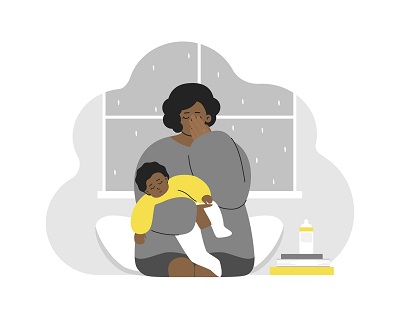Mind the Gap: Worsening Black Maternal Mental Health Outcomes During the Pandemic
Mind the Gap: Worsening Black Maternal Mental Health Outcomes During the Pandemic

Pregnancy and childbirth can be a joyous time in a woman’s life but can also be a challenging one. Besides the physical changes that occur during pregnancy and postpartum, about 20% of women may experience mental health challenges. While increasing awareness of maternal mental health needs has led to various national efforts to improve maternal health care, Black mothers disproportionately face disparities in accessing and receiving appropriate health services. In the United States, Black women are three times more likely to die from childbirth, and Black infants are two times more likely to die before their first birthday.
Regardless of socioeconomic status, Black women have historically experienced higher rates of medical complications (e.g., hypertension, pelvic floor issues, hemorrhaging), poorer practitioner-patient advocacy and communication, and fewer postpartum mental and physical healthcare supports. Awareness of these risks puts black mothers at a higher risk for perinatal and postnatal mood and anxiety disorders (PMADs) such as depression, anxiety, obsessive compulsive disorder, and posttraumatic stress disorder.
It is estimated that Black mothers' risks for PMADs is double that of the general population. Unsurprisingly, the inadequate access to quality and culturally sensitive physical and mental health care discourages Black mothers from seeking appropriate prenatal care which in turn is associated with higher infant mortality as well as lower levels of postnatal care for both the mother and baby. Unfortunately, the rates worsened during the COVID-19 pandemic as Black communities, including pregnant women, became disproportionately impacted by the disease. Further decreased access to care during the pandemic due to reallocation of resources to acute care meant even wider health care inequalities. Restriction surrounding in person medical appointments also contributed to the under-detection of mental health concerns in Black women for whom face to face connection aids in building trust with health care providers.
Conventionally, the role of psychologists in addressing perinatal and postnatal mood and anxiety disorders has largely been limited to clinical work within offices. The intricate cultural, systemic, educational, and now pandemic-related barriers, however, call for the expansion of this role beyond that of reduction of anxiety and depressive symptoms, to include patient advocacy and effective communication, mother and infant health education, and psychosocial support (e.g., breastfeeding and community resource identification). While cognitive-behavioral strategies such as cognitive restructuring, gradual exposure, problem-solving, and communication strategies are effective ways of decreasing PMADs long term, comprehensive standards of care involve integration of professional support and advocacy into treatment. Psychologists are faced with a unique privilege and responsibility of minding the gap when it comes to treating PMADs in Black women.













